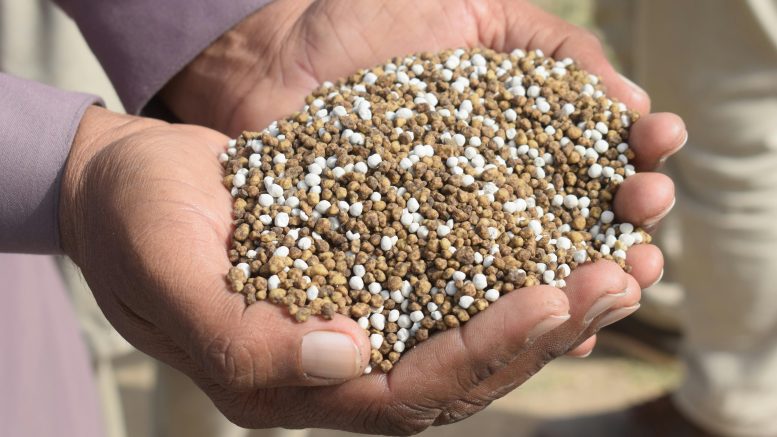Fertilizer Deliveries in Brazil Increased 9%
Integrated operation between the Military Police and the Federal Revenue Service seized 32 tonnes of smuggled pesticides and fertilizers from Paraguay and China in the city of Edéia, State of Goiás. Estimated loss of US$ 1.8 million. The cargo lacked legal identification. (Government of Goiás)
Mosaic reported net income of US$ 411 million in the 3Q25. This was driven by consecutive growth in phosphate production and the company’s solid performance in Brazil, with operational revenue growing 71% and adjusted EBITDA increasing by 190%. (The Mosaic Company)
Luís Fernando Andrade is the new Director of Crops & Campaigns at Syngenta. He has more than 20 years of experience in the agricultural defense sector. (Syngenta)
Ministry of Agriculture of Brazil has requested samples of all products containing glufosinate-ammonium (127), atrazine (119), acephate (78), methomyl (53), epoxiconazole (35), and chlorfenapyr (24). In total, 436 products are under analysis. Companies have up to 90 days from the date of publication of each Notice to submit documentation for evaluation (Phase 1), and up to 180 days to send analytical standards and product samples to the Federal Agricultural Defense Laboratory in São Paulo (Phase 2). (Official Gazette of Brazil, Notices No. 2–7 from November 4th, 6th and 10th, Ministry of Agriculture; 24th AllierBrasil Forum)
Nutriplant, a Brazilian company specialized in micronutrients and specialty fertilizers, reported a net profit of US$ 270 thousand in the 3Q25, a 53% drop when compared to the same period of 2024. Net revenue totaled US$ 10.26 million. (Nutriplant)
Brazilian farmers gained fertilizer purchasing power in October, as the Fertilizer Purchasing Power Index improved by 2%. (The Mosaic Company)
Brazilian Adriana Boock was appointed CPO of Rovensa Next, the global division of the Rovensa Group focused on agricultural biosolutions, including biostimulants, biofertilizers and biocontrol products. (Rovensa Next)
Fertilizer companies in the cities of Carangola and Espera Feliz, State of Minas Gerais, are under investigation for selling counterfeit products to coffee farmers, causing losses and crop damage. The Ministry of Agriculture collected samples for analysis. The names of the companies were not published. (Civil Police; Ministry of Agriculture)
Fertilizer company Fertilizantes Heringer reported a 43.7% increase in net losses in the 3Q25, reaching losses of US$ 2.48 million, compared to a net loss of US$ 1.73 million in the same period of 2024. (Fertilizantes Heringer)
Fertilizer deliveries in Brazil increased 9% from January to August of 2025, reaching 30.5 million tonnes. Imports also increased by 4.6% during the period, driven by strong demand and the search for supply security. (StoneX Consulting; ANDA)
Yara fertilizer company, Ofi, and JDE Peet’s, owner of the “Pilão” coffee brand, signed a partnership to decarbonize coffee production in Brazil. The project will be implemented in over 20 farms in Bahia and Espírito Santo between 2025 and 2027, using low-emission fertilizers and sustainable practices. (Yara Fertilizantes)
Brazil’s Supreme Court began judging the validity of tax incentives granted to pesticides. Minister Edson Fachin voted to strike down the benefits, while Justice André Mendonça partially dissented. (Brazilian Supreme Court)
Marina Veras Dourado Pires, head of the Division of Technical Product Registration at the Ministry of Agriculture, was authorized to attend the Regional Workshop on Environmental Risk Assessment for Pesticides in Mexico City, from November 23rd to 29th. Tatiane Almeida do Nascimento, head of the Division of Formulated Product Registration, will represent the Ministry at the Plant Health Committee and the Bioinputs Expert Group meeting in Asunción, Paraguay, from November 10th to 15th, and will also join the official visit to South Korea, from November 21st to 30th, alongside the Secretary of Agricultural Defense. José Victor Torres Alves Costa, General Coordinator of Pesticides and Related Products, will also be part of the delegation to South Korea. (Official Gazette of Brazil, November 5th and 7th of 2025; Ministry of Agriculture)
The Brazilian Association of Bioinputs Industries emphasized that the regulation of bioinputs in Brazil will require a “unified discourse from the sector”, calling on companies to align and engage in rule-making with the Ministry of Agriculture. (Abinbio)
BNDES launched the Bioinputs Program, allocating up to US$ 11.38 million in non-repayable funds for family farming cooperatives and associations to produce bioinputs on an industrial or semi-industrial scale, with technical support from Embrapa. (BNDES)
Researchers from Embrapa Agrobiology developed a broad-spectrum biological inoculant based on rhizobium strains, capable of benefiting 31 leguminous forest species. The technology expands the use of microorganisms for soil recovery and ecological restoration across Brazil’s biomes. (Embrapa)
Ministry of Agriculture terminated temporary contracts with Mariana Carolina de Morais Sobral and Manoel Figueiredo Neto, who worked supporting the registration review of pesticides, veterinary products and beverages, under Notice No. 5-SE/MAPA/2023. (Official Gazette of Brazil, Termination Statement from November 3rd and 11th of 2025; Ministry of Agriculture)

Latin America
Government, of Argentina, through Resolution No. 843/2025 from the National Service of Plant Sanity and Quality, simplified the registration and import of agrochemicals. Manufacturers may begin operations with a sworn declaration, and products already approved in countries such as the USA, Canada, EU and Switzerland will have easier import procedures. (Senasa)
Fertilizer prices in Argentina have risen again, putting pressure on the profitability of wheat, corn and rice farmers. The input-output ratio has worsened significantly: farmers now need up to three times more grain to buy the same amount of urea. Falling grain prices and higher international urea values, driven by Middle East tensions, explain the situation. (Bolsa de Cereales)
NOVA inaugurated a bio-organic fertilizer plant, located in Santa Fe, Argentina, with an investment exceeding US$ 2.8 million. The FERTI NOVA unit will produce formulations combining beneficial microorganisms, stabilized organic matter, and mineral nutrients, improving plant nutrition efficiency and soil regeneration. The project will create 20 new jobs and reinforces the company’s commitment to sustainability and innovation. (NOVA)
Carlos Fávaro, Minister of Agriculture of Brazil, and Fernando Mattos, the Minister of Agriculture of Uruguay, have signed a Memorandum of Understanding to strengthen bilateral cooperation in the development of bioinputs and biological technologies. (MAPA)

READ MORE:

